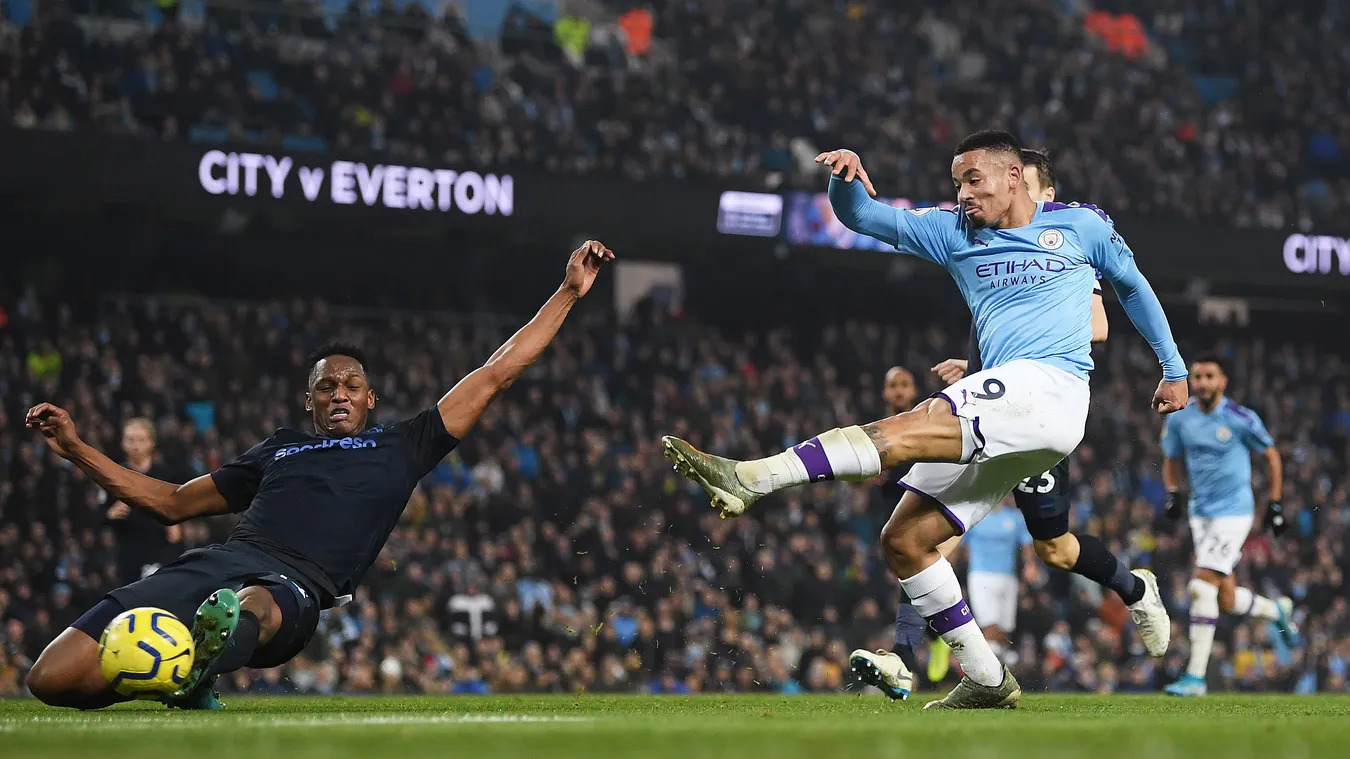
After more than 40 years of operation, DTVE is closing its doors and our website will no longer be updated daily. Thank you for all of your support.
A deal with precedent in unprecedented times – analysing the English Premier League’s rights award

The English Premier League has – somehow – managed to sidestep the Covid-19 pandemic’s impact on sports rights.
Announced this week, the English top flight league has renewed its rights deals with Sky, BT and Amazon with only marginal impacts on the rights valuation.
Tim Westcott, senior principal analyst at Omdia, notes: “The deal currently in place is worth £4.766 billion over three seasons from 2019-20 to 2021-22. Omdia estimates that deal was valued at 11% less than the previous contract.”
Confirming the news, Premier League chief exec Richard Masters said that the new renewals “will reduce uncertainty, generate stability and promote confidence within the football pyramid” and “enable us to plan ahead with increased certainty against a more stable economic backdrop. ”
On paper, the deal is practically the same. Sky will remain as the primary rights holder with 128 matches, while BT sport will show 52 matches. Amazon, which many had speculated would look to improve upon its 20 matches in any sort of bidding, will show two complete rounds of fixtures. An additional non-live broadcast agreement with BBC Sport has also been renewed, ensuring the future of its Match of the Day highlights programme.
The only structural change is the move of the 12.30pm fixture on a Saturday to 7.45pm for teams that had been involved in a Champions League game on the previous Wednesday.
In any normal circumstance, the most watched football league on earth would be loath to not improve upon any existing rights deals, but – as the past 12-plus months have shown – sports rights are in anything but a normal circumstance.
A super league
Since the start of the Covid-19 pandemic, and the subsequent emptying of stadiums around the world, sports rights valuations have taken a nosedive.
The first of the major rights deals to be announced was Germany’s Bundesliga. Sky picked up the majority of the rights for the four seasons from 2021-22, while DAZN increased its number of matches. These rights will be worth a combined €1.1 billion per season, down from the €1.16 billion it currently receives.
Italy’s Serie A meanwhile is in a worse predicament. In March, DAZN was awarded 266 matches per season from 2021-24 in a deal worth a reported €2.5 billion, with operator TIM covering around 40% of the fee as a part of an agreement between the companies.
The league had hoped for an increase of 18% on its pre-existing deals to a total of €1.15 billion per season, but eventually had to back down and settle for negative growth in the rights valuation. Prior to the rights being awarded, a source cited by the FT described the auction situation as “a car crash”.
Suffice to say then, that the EPL has deftly avoided a similar crash of its own – in fact, Omdia’s Westcott describes it as “an excellent outcome for the clubs.”
The analyst also explains: “It also kicks down the road for another three years the question of whether growth in the TV rights of one of the world’s most valued properties has cooled off.”
But the means by which this feat was achieved was not luck or generosity.
How the EPL saved itself
The ultimate reason that the EPL did not lose any value on its rights was because it avoided an auction.
As had been reported at the end of April, the league knew that despite countless cycles of increased value, it would not improve its position if it went to auction and the broadcasters involved were asked to submit bids.
Instead, the league relied on two key factors in order to avoid a rights tender.
The first, and most obvious, has to do with Brexit. 2021-24 will be the first rights cycle in the history of the English Premier League where the UK is not a part of the European Union. As such, the country is no longer bound to EU competition laws which require an auction on such high profile sports rights.
The second reason – and one specifically cited by the Premier League in its announcement – is a piece of British legislation that is more than 20 years old.
Confirming that it had consulted with and received approval from the government, the league said that its declaration will be “embodied in an Exclusion Order under the Competition Act 1998, which will enable the Premier League to conclude the renewals without conducting its normal broadcast rights tender process.”
This was then backed up by a subsequent written statement to Parliament from the minister for sport and tourism Nigel Huddleston.
 In the statement, delivered on May 13 some hours after the EPL announced the award, Huddleston said:“Covid-19 has had a significant impact on the value of broadcast rights for football across Europe. Under an auction, it is plausible that the value of the Premier League’s domestic rights could drop.”
In the statement, delivered on May 13 some hours after the EPL announced the award, Huddleston said:“Covid-19 has had a significant impact on the value of broadcast rights for football across Europe. Under an auction, it is plausible that the value of the Premier League’s domestic rights could drop.”
The MP cited the fact that the league makes most of its money from broadcasting, and that its revenue funds the ‘football pyramid’ of leagues and clubs below it. Huddleston argued that the government “has been clear that football has the resources to support itself financially to deal with the consequences of the Covid-19 pandemic” and that skipping the rights tender will see the league committed to “guaranteeing existing levels of financial support for the football pyramid.”
The EPL has also committed to an additional £100 million of funding to be provided to the football pyramid over the next four years, with more than 1,000 clubs able to access the additional funding.
The suspended auction however will likely only be a one-off for the Premier League. Huddleston stated that while there are “exceptional and compelling reasons of public policy to make the proposed Exclusion Order” it “should be seen as a temporary measure in response to the pandemic.”
Save for another unforeseen pandemic in the coming years, the EPL should be confident that rights valuations across the world will return to some form of growth by the time the next cycle approaches.
Aggrieved parties?
While the Premier League will be happy to ensure this continued status quo, there may be some who will be less-than-pleased with the results.
In broadcasting, DAZN may feel short-changed by missing an opportunity to make a play for the rights. As recently as last month, the billionaire-backed sports disruptor was interested in following up its domestic rights grabs in Italy and Germany with a play for the EPL.
In an interview with Reuters, co-CEO James Rushton stated of the Premier League that “once the tender comes out, we’ll review it.”
If DAZN’s UK expansion plans were dependent on a high-profile acquisition of the Premier League, the company may have to re-evaluate its strategy or consider a legal challenge to the Exclusion Order.
Another broadcaster who may also be aggrieved is Amazon. Amazon dipped its toe into the English Premier League in the last rights cycle, acquiring the rights to two match days per season and simulcasting all 20 matches across the days. Many had expected this first foray to be a precursor to a more serious play to a sustained package of rights throughout the season, but the league has made this stick-or-twist choice for the American giant.
In both cases, Westcott notes that the “tight deadline will mean that companies that might have been interested in bidding for rights may challenge the legality of the process.” This may ring especially true for a cash-rich company like DAZN that may make a better offer than the incumbent right holders.
Westcott also states that such parties may also lobby for more rights to be made available.
From a financial perspective, the English Football League has explicitly stated its objection to the deal. While the addition of £100 million in funding will help teams lower down the totem pole of the English game, that will not cover the second-tier Championship. In addition, the controversial ‘parachute payment’ scheme for clubs relegate from the Premier League has not been altered.
The EFL put out a blistering statement which said: “The current media rights deal will preserve the status quo of an unbalanced, unsustainable, and unfair financial distribution model across English football which continues to cause serious financial issues throughout the football pyramid, while continuing to distort competition between clubs and threaten the long-term viability of EFL competitions and clubs in the Championship, League One and League Two.”
The last party that is likely to be frustrated at the announcement – not from a business or financial perspective but rather a pure footballing one – is the general public.
The return to the status quo, as it were, from the beginning of the 2021-22 season will hopefully see stadiums begin to refill with crowds. But any hopes that the EPL would take this moment of unexpected change to radically rethink its broadcast structure have sadly been short-lived.
While its statement does not explicitly state it, the renewed deal for the three rights holders to broadcast the same number of games will mean a return to a patchwork of coverage. Football fans in the UK who have got used to the experience of their counterparts across Europe, where all matches are broadcast live. Instead, Brits will return to being frustrated by the 3pm blackout, and will inevitably turn to illegal streaming services to watch matches not being shown in the UK – particularly if stadiums still operate at reduced capacity for much of the season.
In total, 200 out of the 380 English Premier League matcher per season will be broadcast in the UK, leaving almost twice as many on the table.
It is however easy to see the benefits for the Premier League. In unprecedented times, a deal which is by all measures entirely with precedent will serve as a security blanket for both the league and its clubs. While Europe’s top leagues have been impacted by severely diminished rights deals, English football has ensured its place at the top of the tree for the foreseeable future, albeit a position that lacks much ambition for progress.




